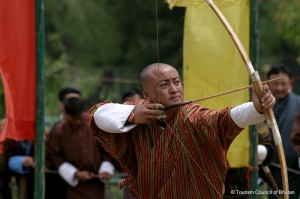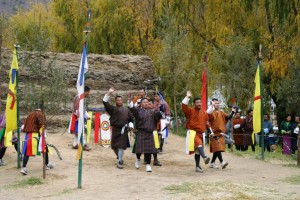
Whoever said the game of archery is boring, should think again.
In Bhutan, under the surface and away from the archery match, there’s plenty happening. From divine interventions and coercions to casting spells and witty barbs, everything is permissible.
The national sport of Bhutan is culturally distinctive because it is a martial sport and echoes the kingdom’s martial history. Every time a major archery tournament is on, be it in the village or at the capital, strange things take place. And if anyone is all pumped up, it is the archers themselves.

It may look like 22 men, armed with bows and arrows, trying to outshoot each other, but there are many more forces at play. Several nights and weeks are expended in the preparatory rituals for the game with a wooden target – a small white exclamation point in the distance, framed by a multi-colored array of scarves and ribbons. Talismans are offered and then brought back from various temples, conferring the prospect of victory on the recipient team.
During the match – the fierceness with which the jibes and insults are traded across the range along with the speed with which the arrows fly back and forth – make emotions run high. And soon, along with the emotions, alcohol flows freely. Bhutanese archery is perhaps the sole sport in the world where drinking goes hand in hand with the game. Indeed, the match is rarely played where there is no ara (local brew) to lubricate the wit.
The game is a complex layer of rituals, ceremony, and beliefs, sometimes rooted in tradition, sometimes bordering on the superstitious and, once in a while, downright ridiculous.
For every player on the field, shadowy figures slip in and out bearing specific instructions for esoteric rituals to invoke the spirits – only it’s too subtle for the simple spectator and a little too complex for the discerning.
It is all about wily tact than a new experience. Divine intervention, albeit forbidden by the National Archery Federation of Bhutan now, is still much solicited. There have also been many instances when a little coercion is exercised. A statue or other artifacts could find themselves reluctant bystanders to the game, covertly stowed away in a place of the team’s choice.
So fierce is the competition that bows and arrows are keenly guarded lest they be defiled by the opponent or touched by a curse. Even the stars or astrological charts are consulted. They dictate time and direction, often culminating in a team very casually strolling into the field, sideways or merely going missing until the eleventh hour. And it’s not just the archers; the vehicles too are parked facing the same direction.
However, all the powers-that-be that have been evoked could as easily be sent packing if such an excursion is spied by members of the opposing team, a counter-offensive could be launched. This is usually done by the Tsip – astrologer – who is highly coveted simply to caste a jinx or to weave contrapuntal liturgy to reverse the spells.
Unlike football though, there is no hooliganism during the game. Yet the competition is stiff. And against the backdrop of whizzing arrows, the banters go back and forth, entertaining the audience and, if skillfully delivered, unnerving its intended mark. An archer, therefore, with good rhetorical skills and a thick skin is as indispensable as any man with a steady aim.
Also, it is not uncommon for a high-performing but tongue-tied team to sign on a wordy man simply to ruffle the opponents. Comments about wives, one’s sexual potency, fathers, mothers, in-laws, ancestry, nothing is off limits.
In short, the archery match is fought on three levels: in the world of the spirits, with well chosen words, and obviously with one’s skill with the bow and arrow. Wouldn’t you pity the non-Bhutanese then, who simply stretches the bow to pick up the game?

